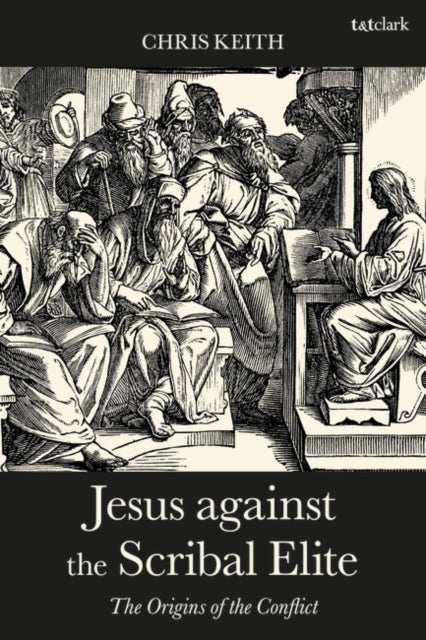ChrisKeith
Jesus against the Scribal Elite: The Origins of the Conflict
Jesus against the Scribal Elite: The Origins of the Conflict
YOU SAVE £4.68
- Condition: Brand new
- UK Delivery times: Usually arrives within 2 - 3 working days
- UK Shipping: Fee starts at £2.39. Subject to product weight & dimension
Bulk ordering. Want 15 or more copies? Get a personalised quote and bigger discounts. Learn more about bulk orders.
Couldn't load pickup availability
- More about Jesus against the Scribal Elite: The Origins of the Conflict
Keith argues that Jesus' lack of formal education and his challenge to an elitist scribal culture led to the controversy between him and the scribal elite, which ended on a cross.
Format: Paperback / softback
Length: 208 pages
Publication date: 17 September 2020
Publisher: Bloomsbury Publishing PLC
The controversy between Jesus and the scribal elite began with Jesus' alternative views on the Torah and his miracle working, but it ended on a cross. Chris Keith argues that an answer to these questions must go beyond typical explanations and consider Jesus' status as a teacher. Keith examines Jesus' own likely educational background and situates Jesus within his first-century context, showing that some of the tensions between Jesus and the scribal authorities may have originated in Jesus' own lack of formal education. Keith builds on his earlier work on Jesus' literacy and uses insights from memory theory and ancient media studies to consider how Jesus' actions and teachings may have specifically been seen to challenge an elitist scribal culture.
Jesus' alternative views on the Torah and his miracle working were a significant factor in the controversy between him and the scribal elite. Jesus' teachings challenged the traditional understanding of the Torah and the role of the scribes in interpreting it. He taught that the Torah was not just a set of rules to be followed, but a living document that revealed the will of God. This view was controversial, as it challenged the authority of the scribes and the traditional religious hierarchy.
In addition to his alternative views on the Torah, Jesus also performed miracles that were seen as a threat to the scribal elite. These miracles included healing the sick, raising the dead, and casting out demons. These miracles were not only seen as a violation of the natural order, but they also challenged the authority of the scribes and the traditional religious hierarchy.
The scribal elite were a group of religious and political leaders who controlled the interpretation of the Torah and the religious practices of the Jewish people. They were often wealthy and influential, and they had a vested interest in maintaining the status quo. They saw Jesus' teachings and miracles as a threat to their power and authority.
One of the main reasons why the scribal elite were so hostile to Jesus was his lack of formal education. Jesus was a carpenter by trade, and he had not received any formal education in the Jewish religious traditions. This lack of education made him a threat to the scribal elite, as they believed that only those who had received formal education were qualified to interpret the Torah.
Keith argues that Jesus' lack of formal education was a significant factor in the controversy between him and the scribal elite. He suggests that Jesus' actions and teachings may have been seen as a challenge to the elitist scribal culture, as they challenged the authority of the scribes and the traditional religious hierarchy.
Keith builds on his earlier work on Jesus' literacy and uses insights from memory theory and ancient media studies to consider how Jesus' actions and teachings may have specifically been seen to challenge an elitist scribal culture. He suggests that Jesus' use of parables and other storytelling techniques may have been seen as a way of challenging the authority of the scribes and the traditional religious hierarchy.
Keith also suggests that Jesus' use of miracles may have been seen as a way of challenging the authority of the scribes and the traditional religious hierarchy. He suggests that Jesus' miracles were not just a display of power, but they were also a way of revealing the will of God and challenging the traditional religious beliefs of the scribes.
In conclusion, the controversy between Jesus and the scribal elite began with Jesus' alternative views on the Torah and his miracle working, but it ended on a cross. Chris Keith argues that an answer to these questions must go beyond typical explanations and consider Jesus' status as a teacher. Keith examines Jesus' own likely educational background and situates Jesus within his first-century context, showing that some of the tensions between Jesus and the scribal authorities may have originated in Jesus' own lack of formal education. Keith builds on his earlier work on Jesus' literacy and uses insights from memory theory and ancient media studies to consider how Jesus' actions and teachings may have specifically been seen to challenge an elitist scribal culture.
Weight: 322g
Dimension: 156 x 235 x 9 (mm)
ISBN-13: 9780567687098
This item can be found in:
UK and International shipping information
UK and International shipping information
UK Delivery and returns information:
- Delivery within 2 - 3 days when ordering in the UK.
- Shipping fee for UK customers from £2.39. Fully tracked shipping service available.
- Returns policy: Return within 30 days of receipt for full refund.
International deliveries:
Shulph Ink now ships to Australia, Belgium, Canada, France, Germany, Ireland, Italy, India, Luxembourg Saudi Arabia, Singapore, Spain, Netherlands, New Zealand, United Arab Emirates, United States of America.
- Delivery times: within 5 - 10 days for international orders.
- Shipping fee: charges vary for overseas orders. Only tracked services are available for most international orders. Some countries have untracked shipping options.
- Customs charges: If ordering to addresses outside the United Kingdom, you may or may not incur additional customs and duties fees during local delivery.


